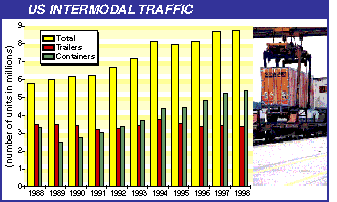Success of Intermodal Could Depend on Attracting Truckers
Don’t bet on it.
Although J.B. Hunt Transport Services of Lowell, Ark., took the plunge a few years back, converting virtually its entire fleet of dry van trailers to containers that could be used on the railroad or on the highway, few other carriers have followed suit.
 TT Graphic |
But while some carriers are growing their intermodal business, they approach the segment with caution.
“It’s a niche,” said William F. Riley III, executive vice president and chief financial officer of Swift. “We will remain primarily a truckload carrier. [Intermodal] is simply part of providing a complete solution for shippers.”
Swift, based on Phoenix, also does a limited amount of trailer-on-flatcar business and is putting some freight on Amtrak trains for cross-country runs.
But most truckload fleets have backed away from intermodal, choosing to concentrate on over-the-road hauls.
Crete Carrier Corp. shut down its refrigerated intermodal operation about a year ago, in part, because it proved to be a distraction for managers of the company’s two refrigerated truck fleets.
“We had too many balls in the air. We were not doing a good job,” said Jack Peetz, chief operating officer at Crete headquarters in Lincoln, Neb.
For the full story, see the April 19 print edition of Transport Topics. Subscribe today.

